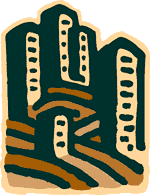
Cities Feeding People
International Development Research Centre
IDRC (Canada)
Development Context
Millions of people in the cities of the South have become farmers in recent decades, growing vegetables, raising livestock, and practising many other types of agriculture in urban areas. These urban farmers, most of whom are women, enjoy benefits that include better diets and a higher income, and they make a significant contribution to the urban environment. Urban agriculture (UA) improves local food supplies, puts marginal lands to good use, and speeds the recycling of organic wastes into productive compost and fertilizers.
Urban agriculture is recognized as ranging from low-income subsistence farming to middle-income home gardening to agribusinesses. Among lower income groups, self-produced food can provide a considerable share of a householdŐs total food, and can save cash income that otherwise would be spent on food.
Cities have been needlessly starved by development policies nurturing rural-urban dichotomies. Most urban agriculture remains largely unrecognized and unassisted, if not outlawed and harassed, even in years of food shortages. Nonetheless, some governments are creating agencies to manage urban agriculture and actively encourage it.
Urban agriculture does, however, require higher technological and organizational precision than rural agriculture, because it needs to be more intensive, more tolerant of environmental stress and very carefully monitored to protect public health.
Goal
Cities Feeding People will encourage policy and technology for sustainable agricultural use of urban resources, with appropriate gender focus, to strengthen:
- Household food security
- Employment and income generation
- Waste and open space management
- Community self-management, particularly for the urban poor
IDRC has concluded that to improve the well-being and health of urban dwellers who are low-income food producers and consumers, and to make urban ecosystems sustainable, both political and technical solutions are needed. The current focus is on research in these fields: confined-space technologies for low-income food producers; safe urban agriculture practices (organic recycling) to reduce human and environmental health risks; and receptive policy and regulatory frameworks for land tenure, zoning and use planning.
At the same time, Cities Feeding People will upgrade regional capacities to share experiences and identify common obstacles. It will look for solutions by building partnerships through networking and training. As awareness towards urban agriculture increases and attitudes change, development agencies are certain to make more effective investments in key research and development areas.
The IDRC Experience
IDRC has been supporting multidisciplinary research on urban food systems and water resources in the South for nearly 20 years. It has staff expertise covering a broad range of disciplines, regions and cultures. Projects on the following topics in have been funded in almost 40 cities (9 in Asia, 15 in Africa, and 15 in Latin America and the Caribbean):
- The reuse of urban waste by urban agriculture
- The workings of urban food distribution and consumption
- The extent of urban malnutrition
- Urban food insecurity
- The urban production and processing of food
Our Partners
The issues around urban food production and food security are so complex that a wide range of people and institutions are working on them. We have been working at the regional level, for example, in Latin America to create a network of researchers called AGUILA. Cities Feeding People recognises and leads growing interest among the development community in managing urban environments in a sustainable way.
At the international level, we have been participating in the Support Group for Urban Agriculture (SGUA) since its creation in 1992. This group is composed of representatives from: bilateral and multilateral development agencies; municipal planners; public and private research centres; and NGOs. In 1996, the SGUA met at IDRC to look at how better coordination on information, policy, research, technical assistance and investment can achieve urban food security, environmental improvement, poverty reduction, and improved urban management. The SGUA agreed to create a Facility to fund and promote this work.
For more information:
CONTACT
Luc Mougeot or
BrendaLee Wilson
Phone: 613-236-6163
e-mail: LMougeot@idrc.ca
BLWilson@idrc.ca WRITE
Cities Feeding People, Programs Branch, IDRC
Box 8500, Ottawa, K1G 3H9 CANADA
Fax: 613-567-7749
VISIT
Internet Website
Homepage:
http://www.idrc.ca/cfp October 1996
http://www.cityfarmer.org Urban Agriculture Notes